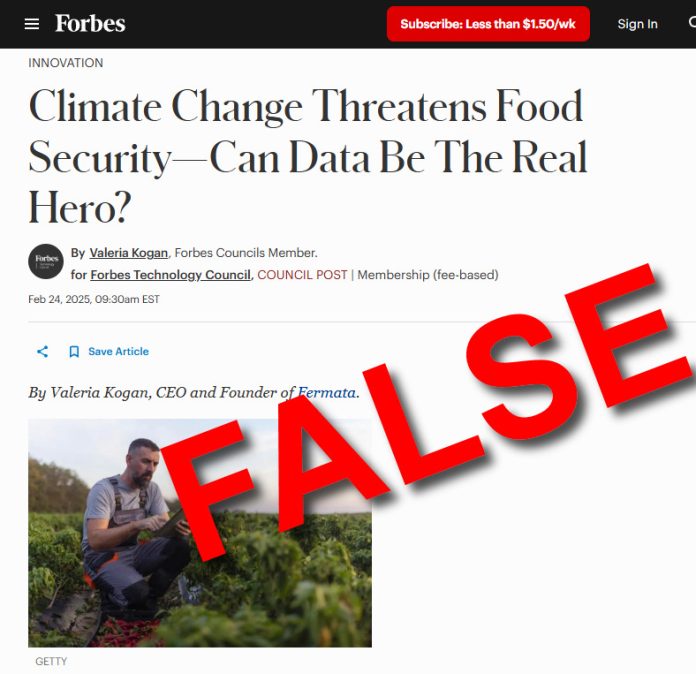A recent Forbes’ article, “Climate Change Threatens Food Security—Can Data Be the Real Hero?” claims that climate change poses a significant threat to global food production. This narrative is not only false, it implies just the opposite of what is true. Real-world agricultural data, and the sciences which study plant growth and food production, show that the modest warming and rainfall improvements thus far have benefitted plant growth in general and crop yields, more specifically.
Agricultural yields continue to reach record highs, and multiple scientific analyses show no evidence of imminent climate-related threats to farming. In fact, a recent peer-reviewed study published in Scientific Reports found no significant global climate-related risks to food production. Yet, Forbes and other media outlets continue to promote an alarmist view that doesn’t align with observed trends.
The study published in Scientific Reports explicitly contradicts Forbes’ fearmongering. Researchers found that climate variability has not led to a global reduction in agricultural productivity. Instead, technological advancements, better farming methods, and increased atmospheric CO₂ levels (which enhance plant growth) have more than offset any minor regional climate fluctuations. The study states:
“There is no clear trend indicating a decline in global agricultural output due to climate change. Instead, yields have continued to rise, supported by improvements in irrigation, genetics, and farming techniques.”
This aligns with broader research that shows human adaptation continues to far outpace climate-related challenges, both real and theoretical. The notion that climate change is an existential crisis for agriculture simply does not withstand scrutiny.
If climate change were truly devastating agriculture, we would expect to see declining yields and widespread crop failures. Instead, the opposite is happening. Global production of staple crops—corn, wheat, rice, and soybeans—has been consistently increasing. The U.S. Department of Agriculture (USDA) and the Food and Agriculture Organization (FAO) both report record-setting agricultural production year after year.
For example:
- Global wheat production is at an all-time high, despite claims that climate change is making farming more difficult.
- Corn and soybean yields have continued their upward trend, benefiting from improved technology, CO₂ fertilization, and better farming practices.
- Even in regions often cited as “at risk,” such as Africa and South Asia, crop production has been increasing steadily.
Forbes’ claim that food security is under threat is debunked by the reality of the greening Earth and record crop yields. The truth is that food abundance has grown dramatically over the last century, and there is no data suggesting a reversal of this trend.
Forbes’ article follows a long line of exaggerated claims about climate change and farming, many of which have been debunked. For further evidence, consider these reports from Climate Realism, which highlight real-world agricultural success despite alarmist claims:
- “U.S. Corn Yields Continue to Break Records, Defying Climate Doom Predictions” —Shows how U.S. corn production has steadily increased, countering the claim that climate change is harming agriculture.
- “Global Food Production Hits New Highs, Again Contradicting Climate Alarmism” —Details how worldwide food output keeps increasing, undermining fears of climate-driven food shortages.
- “Africa’s Crop Yields are Rising, Not Falling—Yet Alarmists Ignore the Data” —Refutes the claim that Africa is suffering from declining agricultural productivity due to climate change.
- And just a few months ago, my colleague, Linnea Lueken, called out Forbes for similar false article in her essay: Forbes is Wrong, Agriculture is Doing Well Amid Modest Warming
These fact filled rebuttals, informed by government and industry data, completely refute Forbes’ claims about food security being threatened by climate change, suggesting that its speculation about the future is politically motivated. Data clearly show that agricultural productivity is increasing, not declining, and scientific research finds no significant global climate threats to farming. Instead of pushing unfounded fear, we should recognize the continued success of modern agriculture, driven by technology, adaptation, and CO₂ fertilization.
Global warming lengthens growing seasons, reduces frost events, and makes more land suitable for crop production. Also, carbon dioxide is an aerial fertilizer for plant life. In addition, crops also use water more efficiently under conditions of higher carbon dioxide, losing less water to transpiration.
The benefits of more atmospheric carbon dioxide and a modestly warming world have resulted in 17 percent more food being available per person today than there was 30 years ago, even as the number of people has grown by billions. Indeed, the last 20 years have seen the largest decline in hunger, malnutrition, and starvation in human history. These facts should have informed Forbes’ analysis of the impact of climate change on food security – instead the media outlet ignored declining hunger and malnutrition to flog the catastrophic climate change narrative.
The real threat to food security isn’t climate change, rather it is flawed reporting being used to encourage and provide cover for bad policies. Restrictive environmental regulations, misguided carbon reduction schemes, and anti-modern-agriculture policies pose a far greater danger to global food production than natural climate variability ever has.
Forbes, as usual, has chosen narrative over nuance. The data tell a much different story—one of resilience, progress, and record-breaking harvests. Readers deserve facts, not fear.




















